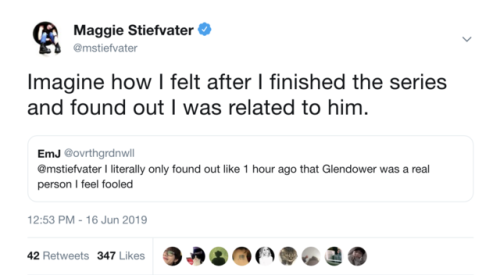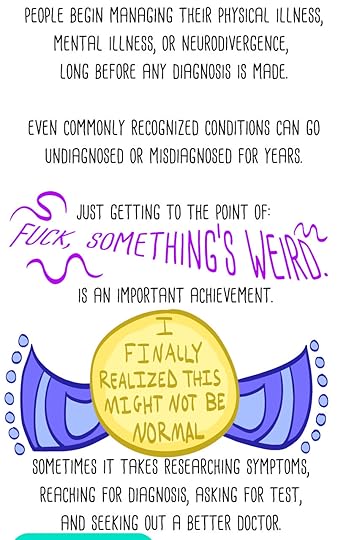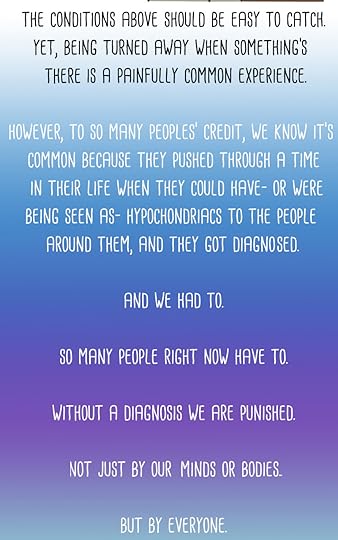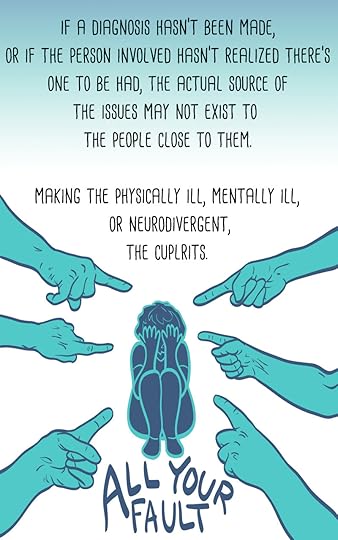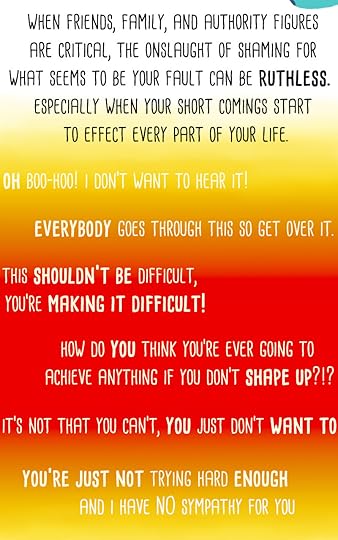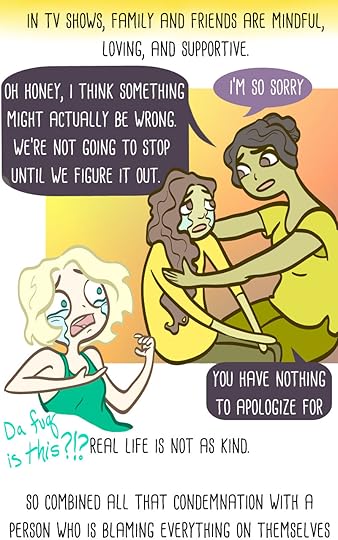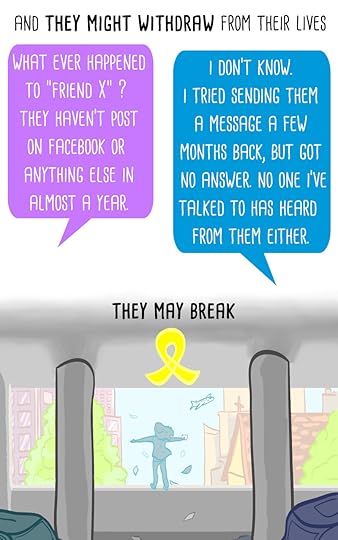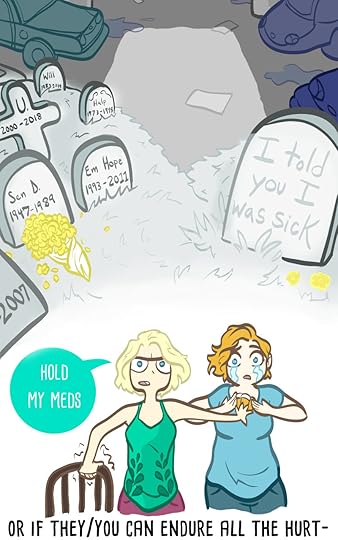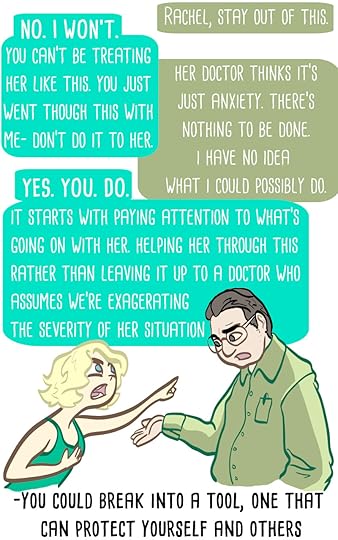Maggie Stiefvater's Blog: Maggie Stiefvater, page 7
June 16, 2019
x
CALL DOWN THE HAWK: EXCERPT REVEAL
Thanks to the incredible power of The Raven Cycle fandom, we can now exclusively reveal the first 8 chapters of CALL DOWN THE HAWK!
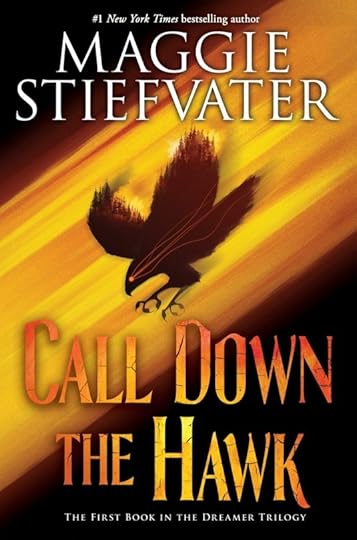
Are you ready?
Call Down the Hawk Exclusive Excerpt by I Read YA on Scribd
Pre-Order Your Copy Now!
inkandquills1066:
cartoon-devil-tail:
Today, I made my first meme.
I don’t know...
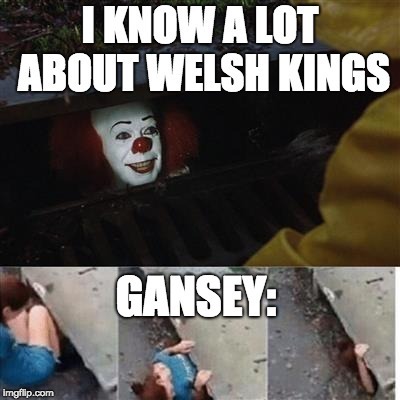
Today, I made my first meme.
I don’t know if anyone has made this joke yet. I apologize if it has. I’m new to the fandom.
June 15, 2019
WRITER PEOPLE

Want to play a writerly game with me this month? I’m leading a project on @hitrecord with @hitrecordjoe and it’s all about fearless storytelling, practicing unlocking ideas, and learning how story-writing can be a collaborative game.
The first step is incredibly easy. All you have to do to start is to head to the site and write about a memory of yours that you would hate to lose. A happy one, a sad one, a memory that made you who you are, a memory that keeps you from being someone you hate.
Why’d I pick that opening prompt? It’s not just busywork. Even though I write novels with a ton of fantasy elements, my novels still have to feel inherently true. If there’s not a solid heartbeat of emotional honesty beneath all the magic, readers won’t bother getting emotionally invested themselves.
Every human is a product of their experience, either running from or running to the influences that shaped them, and therefore, so is every character. The more truthful and real-life you make that emotional experience, the more readers will believe it. The more human you make your characters, the more readers will be willing to follow them anywhere.
So this prompt — what’s a memory you’d hate to lose? Well! What better way to ask writers to practice emotional honesty than by asking them to dig into their own past and ask the hard question: what has made me who I am? What would I hate to lose?
The group nature of this project is going to be a lot of fun later, but it’s going to be cool even in these opening stages, because we’re all going to have a front row seat to the kinds of memories that all sorts of people find important. One of the most crucial things we can do as both writers and humans is learn what about our own emotional experience is exclusive to us, and learn to put ourselves in other people’s shoes instead, and the more folks who participate in this prompt, the more pairs of shoes we’re gonna see filled.
It’s going to be fun.
See you over there for this first step, right?
Hi guys! Day two of the project, and we’ve got a lot of wonderful contributions.
This past year I did a seminar series — ten seminars, twelve-hundred students - on writing. Four hours on how to make the abstract (your story) concrete (on paper). One of the reasons why it’s challenging to teach novel-writing is that that process is different for everyone.
Some people need a lot of pre-planning in the plot department, others in character, others in mood, word choice, structure, etc, etc, etc. For others, planning too much in any of these departments will ruin the “game” of it, ruining the fun of exploration.
It’s a process that is so individual that it’s not exactly teachable … but it is LEARNable. It’s a skill, getting ideas from head to paper, that you get better at the more you practice it.
So when HITRECORD asked me if I wanted to lead a writing project, I knew that was one of the things I wanted to work on. Leaning hard on the skill of what each writer needs individually to story-make. This first exercise — write a memory of yours that you’d hate to lose — is designed to test writers in all the ways they’ll need later. It looks simple! After all, we all have memories! Just pick one! Write exactly what happened! Etc.!
But when you’re choosing a memory that you wouldn’t want to lose because it made you who you are or because it’s better than any other memory you have, you’re practicing imposing story structure onto chaos. You’re prioritizing events and memories in your life, which is exactly what you have to do again and again when writing a novel. You’re doing the heavy lifting of beginning/middle/end.
You’re also doing the hard work of building character. We’ve built characters from origin stories for as long as we’ve been telling stories about humans, but real people are complicated and have many origin stories every year, month, day.
The reality is that any minute of any day could be the beginning of a story, but you’re practicing picking just one and living with it as your beginning. That’s story-telling gold, folks. That’s a huge hurdle. The more you practice that, the easier your story-writing will come.
I was going to record a video with the next bit I wanted to talk about, but I ended up getting one of those summer colds. You know the ones. The ones that leave you with tissue bullets stuffed up your nose while everyone else is playing volleyball outside. Or whatever it is people do in the summer. Anyway, written word it is. Maybe that’s a little more accessible anyway.
We’re just a few days in to the first stage of the project and probably you’ve noticed there are quite a few contributions (which is marvelous). Have you read any of the others? If you have, you’ll have already discovered they run the gamut. They describe life-changing events or mundane moments, far-reaching phenomena or snapshot images. Some are romantic. Some are funny. Some are harrowing. Others are sad, or hopeful.
In my previous update, I talked about how this part of the exercise asked you to flex a muscle every story teller needs: imposing structure onto chaos.
But there’s another thing you’ve done — you’ve decided what this memory means. You’ve decided if it’s happy or sad or life-affirming or crushing.
Um, no, Maggie, you say. I didn’t decide that. It just was happy or sad or life-affirming or crushing. Didn’t you read it? There was no other way to interpret it.
But we’re telling stories about ourselves all the time, and one of the things we do is decide how we feel about a series of events that might have multiple interpretations. Sometimes we decide on a feeling to protect our heart, or to justify our action, or to forgive someone else, or to condemn someone else. Sometimes we decide on it to confirm our opinions of ourselves or other people.
This is getting pretty heady. Lemme give you an example.
The other day, a guy on an airplane told me a story about an old German coworker he’d had once. The coworker was a child during World War II. His father was a successful businessman with lots of resources, and so although he knew from the beginning that this was a bad situation and he needed to get his family out of Germany, it wasn’t as simple as packing up what he could carry and leaving; they had a lot to lose. So instead, the man’s father spent months slowly smuggling family members out of Germany. Strapped under vehicles in the dark of night, cloak and dagger stuff. It took him literally years even with his influence, and the man’s brother was the hardest to get out, but eventually, it was just the 8 year old boy and his father. And then the war ended. They were in what was to become East Berlin. The father worked hard to get papers to get his remaining son and himself out of Berlin before it was too late. The German told my airplane seatmate that he remembered the day well when they came to the checkpoint. There was the checkpoint on their side, guarded by Russians, and a no man’s land, and then, the checkpoint on the other side, guarded by Americans. The German’s father handed over his papers, but there was something wrong with them, and the German confided that he could tell the moment when his father realized it wasn’t going to work; he’d failed. That was when the German’s father punched the Russian soldier right out. “Run!” he told his son. And the 8 year old German ran across the no man’s land as bullets rained around him. The father followed him, after a skirmish with the soldier. The American soldiers snatched the German boy to safety, and as they did, the boy watched his father get shot. He died on free soil.
When the man on the airplane was done telling the story, I said, “What a sad story. He survived all those years only to die after the war ended.”
The man on the airplane gave me a genuinely puzzled look. It was an inspiring story, he told me, according to the German. His father had worked the entire war, risking everything, to get everyone he knew and loved out of Germany and to safety. In the end, the only person remaining was his young son, and he lived to see his dying wish come true: his final family member safe, his life’s work done.
Oh, I said.
Because I could see how that could also be the meaning of the story. The exact same events, but meaning something very, very different.
We often subconsciously decide these meanings of our memories, of the stories of our lives. Storytelling asks us to do it consciously. Because one part of storytelling is the series of events. But another part is telling the reader how we feel they should feel about those events.
Before we head into the next stage of the project next week (hint! It will involve fearless storymaking!), I’d like everyone who’s contributed a memory to comment on one other person’s contribution with a song or an image they think matches the mood of the story.
This is for two reasons: first, because effective storytelling involves making sure that your audience experiences your story the way that you mean for them to. But it’s also because satisfying storytelling isn’t complete until you have that audience. Knowing someone’s listening and reading makes all the difference in the world, and we can be each other’s first readers.
Go make someone’s day.
See you on the other side.
1000drawings:
by Emily Winfield Martin
rachelwann:
sabertoothwalrus:
one-of-the-birds:
katsen13:
animalwoonz:
Instagram: @animalwoonz
He looks...








Instagram: @animalwoonz
He looks like he’s trying so hard to be a fearsome bird of prey and I’m so proud of him even if he wasn’t successful.
Tiny fluff ball of DEATH
AHHHH I THOUGHT THIS WAS A KESTREL BUT ITS AN AFRICAN PYGMY FALCON

AHHHHHHHHHHHHHHHH
lsleofskye:
Chile
trb752:
1936 Delahaye type 135 Competition Court Teardrop Coupe by Carrosserie Figoni et...






1936 Delahaye type 135 Competition Court Teardrop Coupe by Carrosserie Figoni et Falaschi
Photo Credits: Michael Furman ©2013 Courtesy of RM Auctions
Maggie Stiefvater
- Maggie Stiefvater's profile
- 171422 followers


